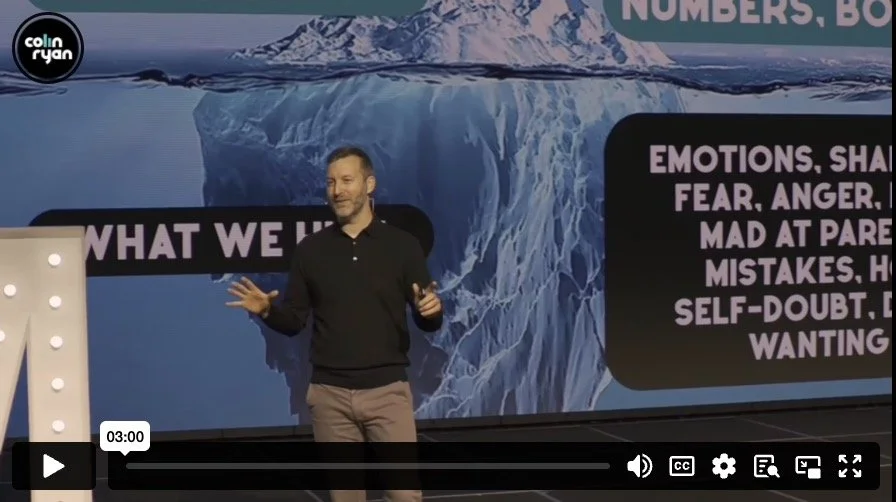
The Hopeful Guide to Mental Health
Humor & Award-winning Storytelling Combined in an Inspiring Message About Connection and Belonging
“In a beautifully compassionate way, Colin captures the power of the mind and how we can change it. The humor he deploys to explore depression is simply brilliant!” — Raya N., Clinical Mental Health Counselor
See Colin on Stage
Since the above book launch performance was in an informal setting, you can also watch Colin’s professional audiences Keynote Speaking video on the Human Side of Money by clicking here.
Book launch performance at Tongue & Groove Open Mic in Raleigh, North Carolina. | January 2026
Colin is a seasoned keynote speaker, an nationally-recognized storyteller, and the author of A Comedic Guide to Money and Epic Tiny Victories: A Hopeful Story about Depression, Anxiety and Reframing Your Life.
Colin combines years of speaking experience, content expertise, and intentional customization with your event’s goals.
(And see awkward childhood photos…)
Get a sneak preview of Colin’s 2026 book: Epic Tiny Victories
“Poignant, honest, funny, unexpected. Reminiscent of Gary Gulman’s The Great Depresh. Brings the hidden topic of mental health out into the open.”
Rachel, adult educator, Vermont
From Honest Storytelling to Inspiring Keynote
Using humor, storytelling and vulnerability, Colin makes the challenging subject of mental health accessible and discussible. This talk/performance will show you how your ability to manage your mind directly affects your ability to have the life you want. Skills Taught: the value of seeking out counseling; wellness strategies and systems for success; how to have authentic, connecting conversations; building confidence and sharing your story. [60 min]
COVERS:
In this entertaining and educational experience, your audience will learn:
how to use mindfulness to identify and respond to unwanted thoughts
how to replace coping mechanisms with habits for health and happiness
how to build positive relationships that strengthen your self-image
the value of counseling and building a support network
how to navigate inner critic and impostor syndrome
Colin will also spotlight your resources and upcoming programming.
DETAILS:
Length is 45-60 minutes. Can be performed in a theater or a typical presentation environment. Technical Requests One-Pager.
PERFECT FOR:
Students, Professionals, Entrepreneurs, Educators, Mental Health Counselors, Allies & Advocates
Download as a Convenient One-Page Keynote Summary
LEARNING OUTCOMES
Understanding Learned Rejection:
Growing up in a chaotic environment, you are rewarded for not making a fuss and not honoring your feelings. You self-soothe through coping mechanisms like emotion suppression and denial of your self-worth. In other words, you replace loyalty to yourself with loyalty to the external world.
Distinguishing an Inherited vs. Chosen Confirmation Bias:
Impostor syndrome creates a version of reality where you are suspicious of other’s affection, because it doesn’t confirm your own bias that you really know yourself and have rejected yourself before others have the chance to do it for you.
The Brain’s Instinct for Protection and Projection:
Authentic relationships threaten the alter ego you create — a version of yourself you cannot access but you can fake. This alter ego starts out as a way of protecting yourself but it also prevents you from progressing and working through your real feelings. And * double bind alert * you judge yourself for not living up to your alter-ego’s reputation as someone who always knows what to do and what to say.
“We were super impressed with how engaged our students were in Colin’s message, and how willing they were to share. Colin brings that out in people with his authentic and relatable way of talking to the crowd.”
Have a date in mind for your event?


